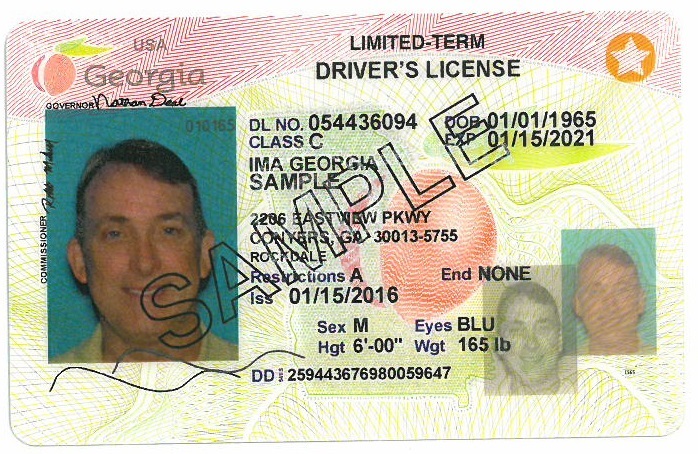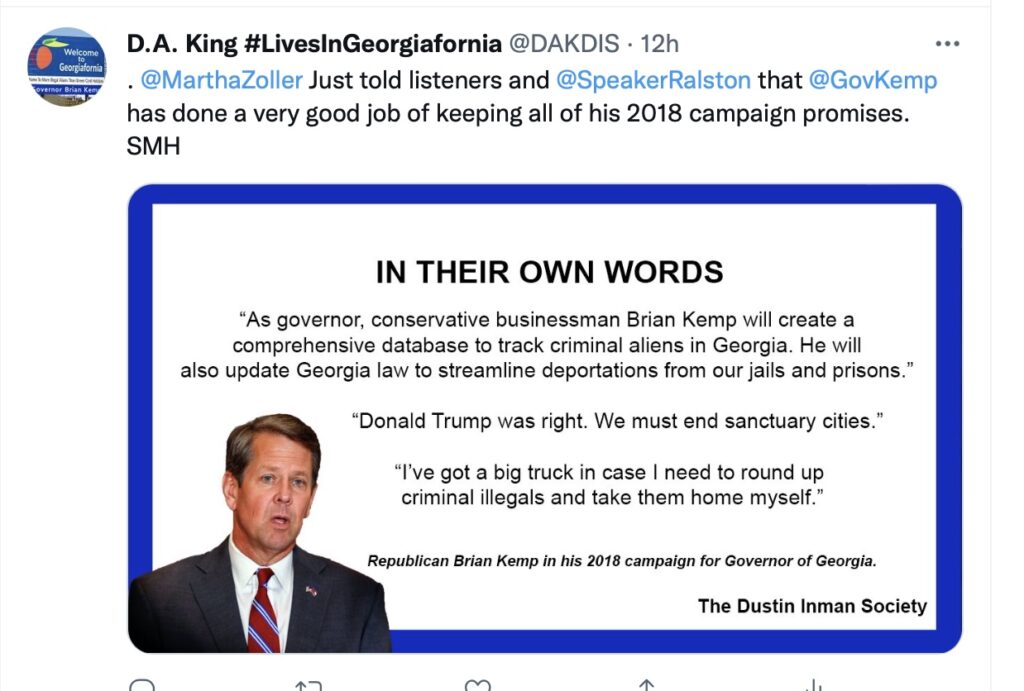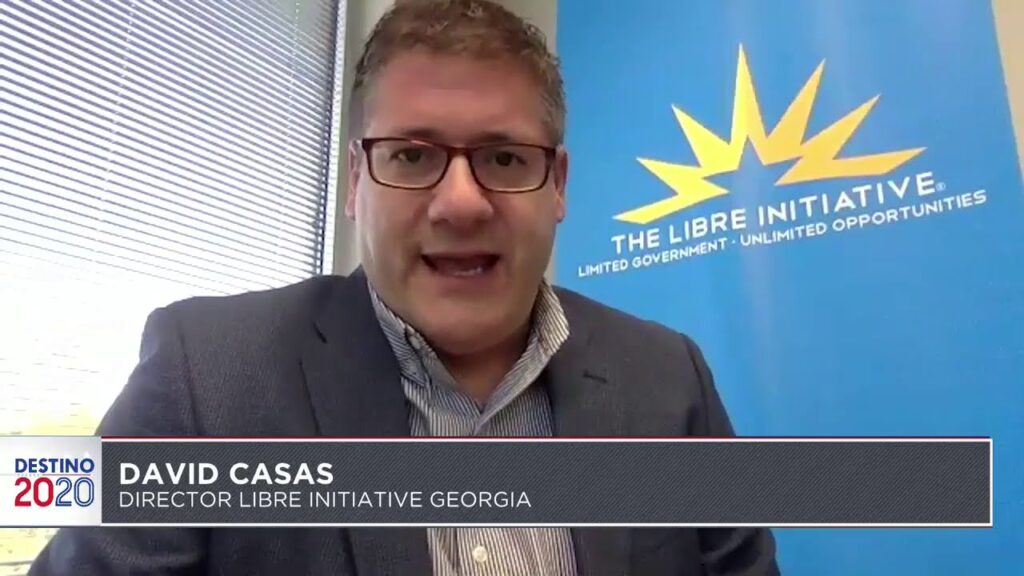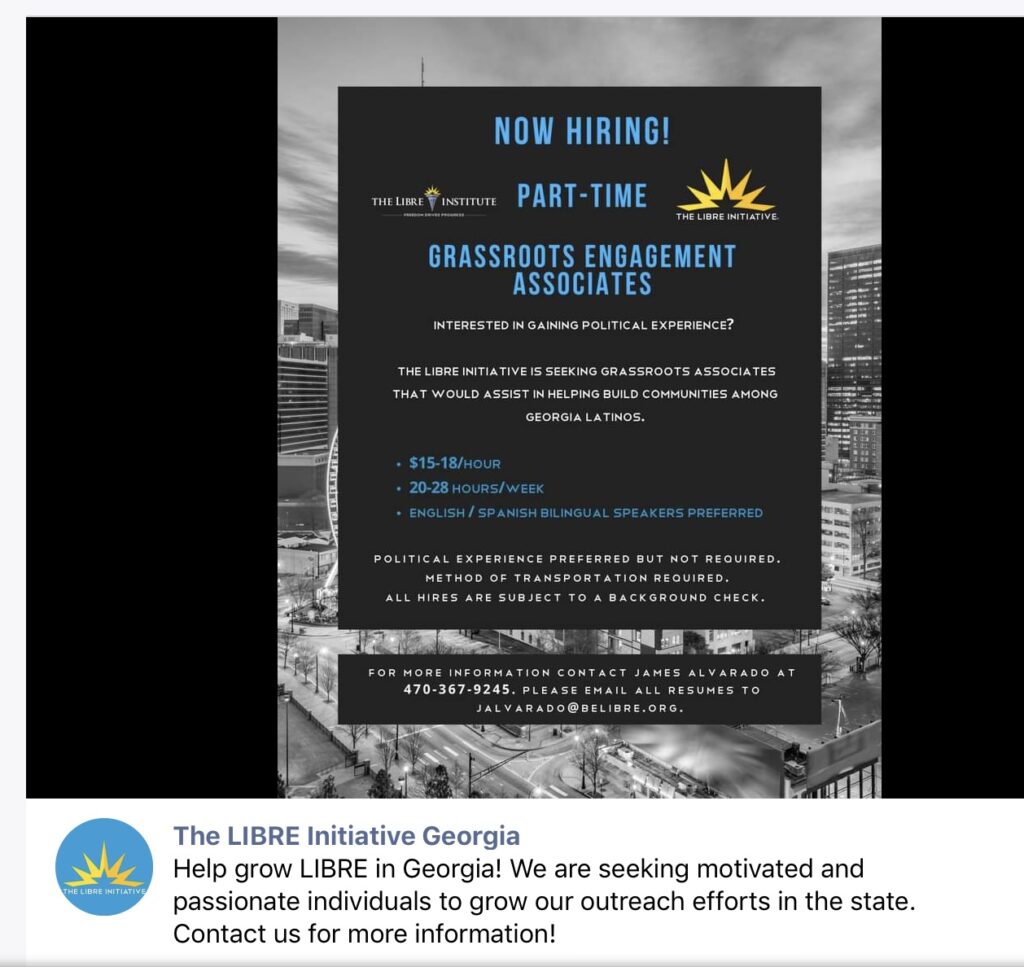
A note for beginners: Jaime Rangel is an illegal alien who lives in the Dalton, GA. area. He has worked for the notorious, corporate-funded GALEO Inc., has lobbied in the Georgia Capitol against passage of legislation designed to make life difficult in Georgia for illegal employers and illegal aliens. As a staffer for the billionaire lobbyist company, ‘FWD.us,’ he now lobbies here in Georgia and in Washington D.C. against immigration enforcement and for a repeat of the failed 1986 “one-time” immigration amnesty. He can work legally in the U.S. now because Obama’s illegal DACA decree granted him and about 700,000 other illegal aliens a “work permit.” If he worked before DACA, he worked illegally .
Rangel is the darling of the liberal media that is constantly helping in the well-funded push for another amnesty.
Related: More on GALEO Inc. here and here and here.
Here is a newspaper column with Rangel’s name as author published in the liberal Dalton Daily Citizen in 2019. Here is my response to that column. He has several more. Most newspaper editors in Georgia do not run responses to anti-enforcement goop anymore.
Related: A reminder from the liberal AJC on the label “anchor babies” – children born in the U.S. to illegal aliens – is used: “…Rangel’s younger brother, Eric, was born in America, making him a U.S. citizen. And Eric has sponsored their parents, helping them get lawful permanent residency (green cards) here.” – AJC story here. Here is how that works.
______

Martha Zoller: (00:09)
Jaime Rangel is joining me right now. And, um, Jaime, is it Jaime or is it (H)aime?
Jaime Rangel: (00:15)
Well, Martha, I’ve grown up in northwest Georgia practically my whole life, and I’ve been called both Jaime and Jaime, and I take no offense. So, uh-
Martha: (00:22)
Oh okay, great.
Jaime Rangel: (00:24)
… uh, look. So I’m-

Martha: (00:24)
Thanks.
Jaime Rangel: (00:24)
… I’m down with whatever, whatever y’all wanna call me, Jaime or Jaime, I’m perfectly fine with that.
Martha: (00:29)
That’s great. And you’re with FWD.us, and I wanted to, for you to give people just kind of an update on the cases related to DACA, because we’re coming up of 10 years of DACA. Uh, there’s, there’s cases in the courts right now, I know you’ve been very involved in that, so, can you give us an update?

Jaime Rangel: (00:47)
Yeah, so, um, and in fact before we went onto the show, like, um, there was b- a debriefer that was on, and it kind of explained it already. There is a, a decision… I mean, I’m, I’m sorry, let me back up. There is a court, um, the Fifth Circuit Court of Appeals yesterday heard an appeal from the admi- from the administration and MALDEF, [inaudible 00:01:06] and MALDEF, um, to appeal the decision from the lower court in Texas that is trying to end the program of DACA on the basis of the Constitutionality.
Jaime Rangel: (01:15)
Um, given a Senate hearing, this fifth circuit is a very antagonistic court, it’s not really a good court that represents the view of 75% of the country that wants a solution for DACA recipients who want the immigrants to stay. And we believe the outcome could come out ugly, and the DACA program could be in a situation recipient of the program, of the very popular program, will not be able to renew the work permit. Will not be able to go to our schools and teach our students, will not be able to go to our hospitals and heal those, and heal those that are sick. And they will not be able to contribute to the economy.
Jaime Rangel: (01:54)
But it’s a very scary situation for recipients not just in Georgia but around the country.
Martha: (01:55)
So overwhelming I think most people, and if you explain what a DACA kid is, that’s a kid that has been brought in the United States with their parents, their parents have brought them here illegally, but basically they have only known the United States as their home. And what, you know, even among people like me who are very much, uh, have a problem with the way our immigration system is right now, and I, I think we have way too many illegal, way too much illegal immigration into this country, and that we have lots of things we need to fix, okay?
Martha: (02:29)
But I see, you know, that this is a group of people that, that have been expected to have some kind of, uh, grace, from the United States of America. And so, and they have for the last 10 years. Two questions. This could have been codified in law, there have been opportunities. I mean, at the beginning of the Trump administration there was an offer from President Trump that if you could give us some money for the border wall, we’ll give you some protection for DACA. And that was, that was not dealt with.
Martha: (03:00)
We seem to have this ongoing problem with Congress not being able to codify the things in law that they should, and then they just wait for the courts to decide things. So, you know, how do we get out of this mess?
Jaime Rangel: (03:13)
Yeah, and Martha, I just wanna echo, like, um, you’re not alone on the frustration. The frustration’s on both sides of the aisle. And you mentioned this program is very, very popular. And it’s just crazy that both sides of the aisle, and this, this, this bears the plot on both sides of the aisle of not being grown up, and this is the will of the American people.
Jaime Rangel: (03:30)
And it’s going to come a time, unfortunately, um, in this court, that whatever the decision happens that affects it, it’s going to wind up in the Supreme Court, uh, win or lose, and there’ll be a few that would then go to the Supreme Court, guaranteed. Um, but the reality is that Congress needs to wake up. And it’s unfortunate that we wait till things get ugly, and then Congress reacts, and it shouldn’t be like that, Martha, it really shouldn’t.
Jaime Rangel: (03:52)
Um, and I’ll give you an example, here in Georgia, we are, just an example of how we could be moving the immigration conversation the right way is that and herein Georgia, we, we worked with Representative Kasey Carpenter, a representative from the, the, who lives in the Fifth House District up in Dalton, who lives in a very conservative Congressional district, works with democrats to a, a, a variety, um, pro- to propose a legislation that allows DACA recipients to pay in-state tuition if, you know, they could prove, you know, that they grew up in Georgia, and which most of them have, and who are, you know, being here working hard to get in-state tuition.
Jaime Rangel: (04:27)
And that’s a good example of legislators working together doing the will of the people of Georgia, doing the will of the American people, and trying to push legislation forward. And at the end of the day, Martha, like it, Congress needs to act, they need to realize that, you know, the malarkey’s going to hit the fan, and if they don’t act, peoples’ lives are going to be devastated. And not just DACA recipients, we have to understand we work in different industries. We have a labor shortage right now in this country, we have an inflation problem in this country, there is no denying that.
Jaime Rangel: (04:57)
But passing immigration reform or allowing DACA recipients to be in this country, to have a piece of mind, helps curb that inflation, helps to continue contributing to the country. What, I’ll give you an example, we have $1.3 billion in spending power alone in Georgia, and we contribute 100 million into state and local taxes, in, in Georgia. I mean, come on, this will affect our state, um, it will only hurt our labor shortages, it would only hurt, uh, continue to hurt inflation if Congress does not wake and act.
Martha: (05:26)
So what can the average person do? ‘Cause we’re waiting for the courts right now. Um, but-
Jaime Rangel: (05:31)
Yeah.
Martha: (05:31)
… what can the average person do?
Jaime Rangel: (05:35)
Um, Martha, I think what the average person can do and should do is call their member of Congress and say, “You’ve got to stop bickering.” This is a group of people that over 75% of the country agrees should stay in this country, and we need a permanent legislative solution. People just need to pick up the phone and call their, their Congressman, and call their US senators to act. Because both sides need to come together, they need to grow up, and find a solution. I’m frustrated, Martha.
Jaime Rangal: (06:00)
About 90, uh, uh, and the, like you mentioned earlier, a lot of people are frustrated because it includes (laughs) every popular, um, program, and yet, Congress cannot act.
Martha: (06:10)
So, how does, uh, FWD, are they taking a position at all on the crossings at the border right now, and all of the, that sort of thing? Or, are they focused primarily on DACA?
Jaime Rangel: (06:23)
Right now we do, uh, we are focused, and a great, like, I would say a great, our goal is to fix our broken immigration system. We have issues at the border because our immigration system is broken, and we don’t have a way for people to come here through a legal process. And then the only process they have for example is to seek asylum. And when they get to the border to try to seek asylum, that process in itself is broken as can be.
Jaime Rangel: (06:45)
So our goal is to work together, uh, with people on, on the Hill, no matter what party affiliation, and to try to fix our broken immigration system. Right now, for example, I will say that DACA is on top of our, on top of our agenda. We’re trying to work with Congress to find a solution, we’ll try to work with the administration to find a solution. Because this is like I said earlier, this is going to be in a situation where recipients might not be able to renew once the Appeals Court makes a decision, and that’s a scary situation to be in right now.
Jaime Rangal: (07:15)
We’re talking about over 600,000 individuals around the country all of a sudden not being able to continue their work permit, um, and not being able to go to work. And um-
Martha: (07:24)
So-
Jaime Rangel: (07:24)
… and I would, I want the listeners to understand that renewing a work permit, we have to do it every two years. We have to show to the government we’re not criminals. And it’s a very tedious and expensive process, but yet we’re doing it because we’re given an opportunity to show the country who we really are, and that we’re just here to contribute to be a part of society, and to help our country grow.
Martha: (07:45)
So, um, what do you see as the next step here? Because, you know, I think that most people would want to see, uh, DACA codified into law so that people knew what the rules were. But also, you know, I think we need big changes in our immigration system, I think we need, you know, I was a big supporter of the Raise Act, okay, where I think that, that that got us in the right direction, because it actually got us to where we were going to clear out some of these green cards, and we were going to be able to, uh, be able to look at things a little bit more on a merit basis.
Martha: (08:19)
But it didn’t even get to a debate. We’ve got to actually have real debates on this, because if we don’t, we’re never going to solve this problem.
Jaime Rangel: (08:28)
Mar- Martha, I 100% agree, and, uh, this is why I wanted to come onto your show, because we need to have that dialogue. And I think the American people wanna hear that dialogue, they want to hear us talk about our broken immigration system through a different perspective, because unfortunately there’s a lot of misinformation, um, first of all who DREAMERS are, of, like, of, of what we’re actually planning be here, to do, and um, people assume that it, that that get being legal or getting in line.
Jaime Rangel: (08:55)
Well for us, there is no line, unfortunately, there is no line for us to, you know, be part of this country, um, and find a, a pathway to citizenship. There is no, there’s no part of that. So-
Martha: (09:08)
So, so let me-
Jaime Rangel: (09:08)
… I do definitely agree with you for that.
Martha: (09:09)
… let me ask you a quick question. So the Trump proposal that he did at the beginning of his, of his time as president, which was basically allowing, uh, the, the DACA kids, as well as their parents, to get legal status, um, was that something you all were in favor of at the time?
Jaime Rangel: (09:28)
I’m sorry, can you repeat that again?
Martha: (09:29)
Uh, the Trump proposal at the beginning of his term in president, wh- as president, was actually, you know, the DACA kids at that time, I think the number was 670,000, I don’t remember exactly what the number was. But it also included their parents, a legal status for their parents. Um, was that something at the time you guys could have been in favor of? It never got to a legislative proposal, because Nancy Pelosi said “No” right out of the gate because they wanted to have funding for the wall included too.
Martha: (09:58)
But it sounded m- to me like a very reasonable proposal at the time.
Jaime Rangel: (10:03)
Um, unfortunately that, the legislation remained a proposal, so what we did during that time is that we worked with both sides of the aisle to move legislation forward and put that in writing, and move something uh, across the finish line. And um, that’s what we were doing at the time. We, we have to understand that we need to work together, and-
Martha: (10:20)
Yeah.
Jaime Rangel: (10:20)
… we understand we need to work together. And we’re going to continue doing that right now, and we’re going to continue pushing for legislative solutions that did reflect the will of the American people.
Martha: (10:29)
So if people want to know about, more about FWD, how can they do that?
Jaime Rangel: (10:33)
Sure thing. Um, well, it’s very simple, we have a very, a website that you can visit at FWD.us. Um, and we have a lot of good information there, and in fact, we just came out with a new report that extends, like, hm, uh, a report that it’s all about a decade of DACA for students, to careers and families. And it shows an overview of where DACA was just then going 10 years into the program. And it’s very interactive, for example, in Georgia we have a population of 20,000 individuals, the average age now is, and the average year they live in this country have been over 20 years.
Jaime Rangel: (11:08)
Uh, how 37,000 US citizens, and this is very key, is that 37,000 US citizens live with documentation. We have individuals who live in mixed-status families, where, let’s say, example, uh, my, for, for example, we have a brother who is a US citizen, but unfortunately he has a younger sister, um, is a DACA recipient. Because of a broken immigration system, you know, we had these mixed status families. So, and that’s for, that’s a key number there, I, I encourage people to go visit that website and learn more about, um, you know, about DACA recipients, uh, what is that for, and how we’re trying to work together to pass common sense solutions that represent the, the will of the American people.
Martha: (11:47)
Sounds great. Thank you so much, uh, Jaime, for being with us, Jaime Rangal from FWD.us, we appreciate you being with us today.
Jaime Rangel: (11:55)
Thank you, Martha, you have a blessed day. Thank you, thank you.























